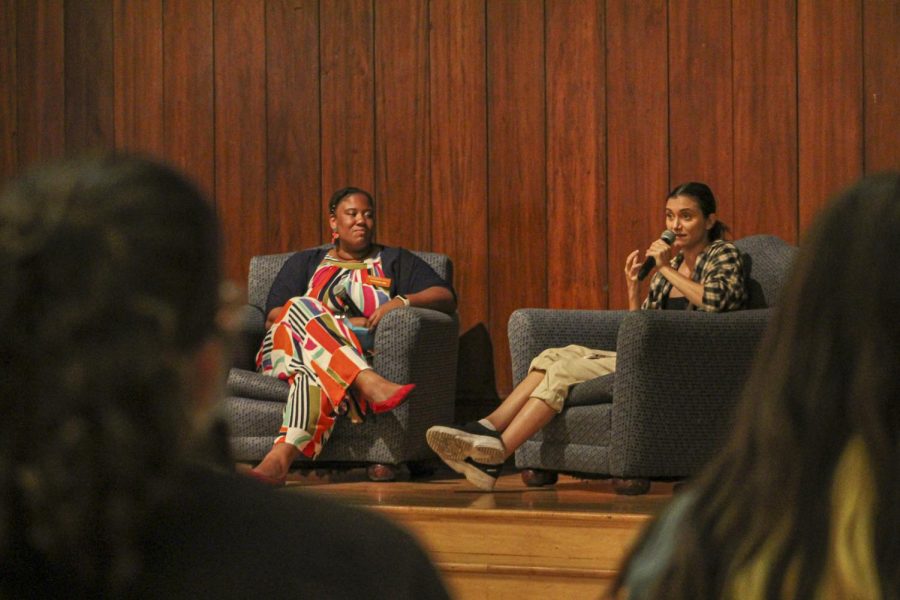‘She’s really good’ … at prioritizing mental health: Camp Rock star Alyson Stoner discusses importance of self-care
September 15, 2022
Former Disney star and mental health advocate Alyson Stoner visited UT to educate students on the importance of the body and mind in mental health during a discussion Wednesday.
“When we talk about mental health, usually the tools — whether it’s mindfulness, meditation (or) medication — tend to only focus on what’s happening in your head,” Stoner said. “But in reality, stress and anxiety and depression are all being lived out in your body. You’re carrying that every day, in your muscles.”
About 100 students attended the event, which was organized by student-run speaker series Distinguished Speakers. In her conversation with Tina Alexander, a counselor from the Counseling and Mental Health Center, Stoner said acts of self-care that bring joy can help improve a person’s quality of life.
“There’s legitimacy to being persistent and what it takes to realize a dream,” Stoner said. “(But) when … I went in initially with the mentality of no pain, no gain, I assumed that in order to feel joyful, it was going to have to hurt.”
Stoner, who is known for movies like “Camp Rock,” co-founded Movement Genius, a digital platform focused on mental and physical well-being.
“My heart and everything is becoming passionate about well-being – true well-being – not just (your) green smoothie (and) yoga pants,” Stoner said. “There is more to you flourishing as a human.”
Stoner said she has used to feel unsafe in her body because of the high-stakes pressure in the entertainment industry.
“At a young age, I learned I was a commercial entity,” Stoner said. “It’s very hard for a young person who’s never formed their own identity to begin with.”
She said learning what strategies worked for her allowed her to “feel like (she had) a sense of control over (her) own health” and inspired her to help others reach that same place.
Stoner’s focus on mental health and LGBTQ representation made Distinguished Speakers interested in bringing her to campus because of how relevant her work is for college students, said Zenith Jahid, chairperson of the lecture series.
The event was moderated by Alexander after Stoner requested a moderator from a marginalized community in order to uplift new voices in mental health conversations. Alexander said Stoner’s decision showed she was “being really intentional and thoughtful about using (her) power in public spaces.”
Taylor Carmona, who attended the event, said before the lecture that she looked forward to hearing diverse and outspoken voices acknowledge the importance of mental health.
“Kids here are going to connect with her because we are familiar with her,” art history senior Carmona said. “It’s a familiar voice talking about stuff that most of us here probably care about a lot.”
College students often struggle with finding a sense of purpose, Stoner said. Instead of feeling a need to follow a specific path, or a “north star,” to find success, Stoner suggested thinking of purpose as a constellation by focusing on smaller goals instead of one big, specific one.
“I tend to have this perfectionist quality where there’s a pretty big fear of failure,” Stoner said. “The idea of the constellation really showed me that you can learn and stumble along the way and that can still be productive.”












